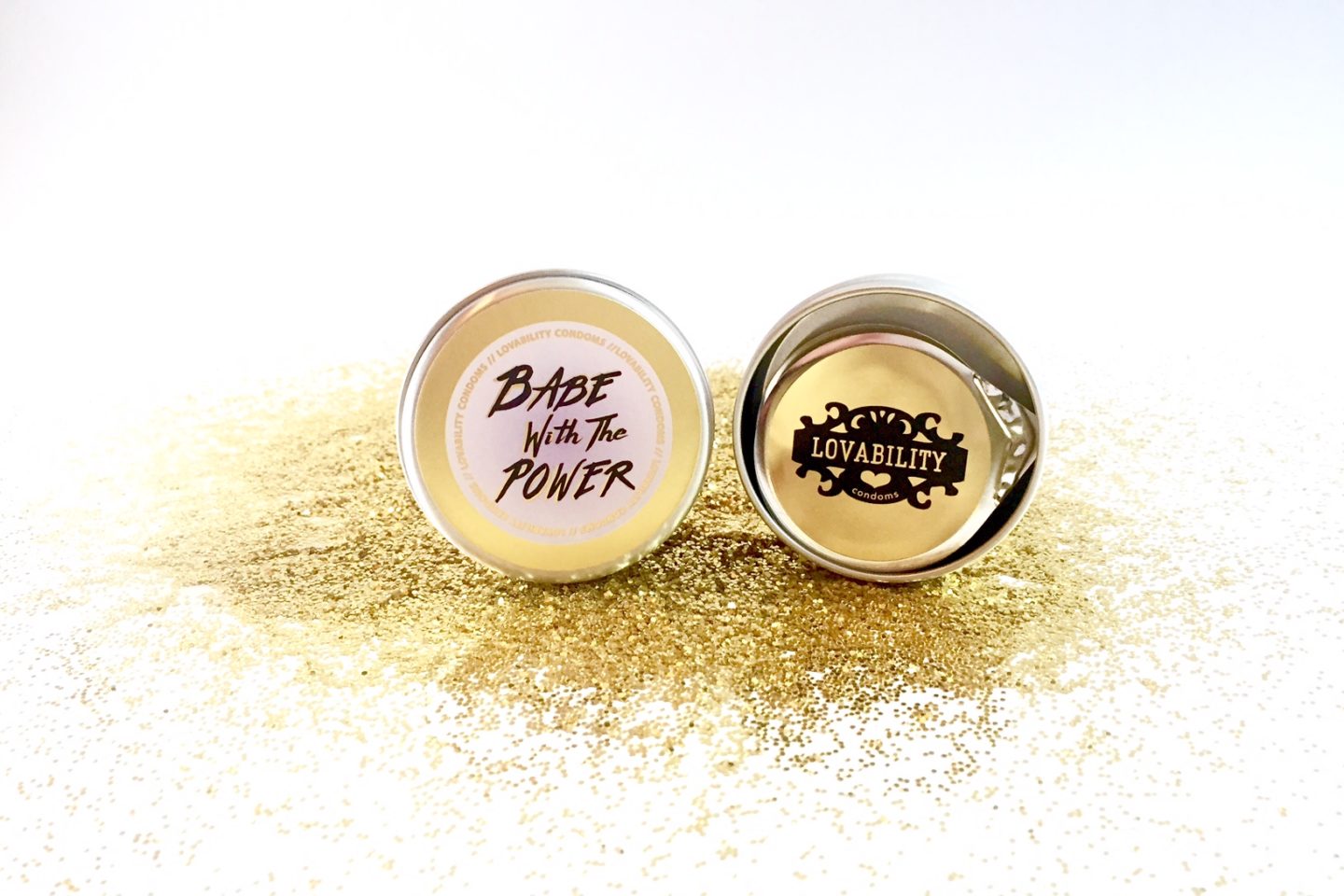There are few feminist companies that I love more than Lovability.
Lovability is a feminist condom company with one very special mission: to put condoms in the hands of women and feminine people everywhere. As a person who is almost as passionately sex-positive as Lovability’s cofounders (Claire Courtney and Tiffany Gaines) are, I adore their efforts to reframe the national conversation about sex through their products and social media presence. They are one of the first companies ever to market condoms specifically to a feminine audience, condoms that empower through their message, easy-to-open container and scent-free material. Additionally, Lovability aims to expand the mainstream definition of sex and sexuality, made apparent by the brand’s sex-posi tweets and Courtney’s background as a sex educator.
Recently, I got to speak with co-founder Claire Courtney about Lovability’s mission, the brand’s latest additions to their online shop and Courtney’s passion for inclusive and thorough sex education.
The following conversation has been edited for clarity purposes.
Helloflo: How would you define sex positivity?
Claire Courtney: Sex positivity embraces happy, healthy, consensual sex as a good thing. It’s a form of acceptance. Accepting other people’s desires, boundaries, expressions and identity. Accepting pleasure and its role in our lives.
HF: How does Lovability incorporate sex posi into their brand, and why is that important?
CC: We like to say our condoms are infused with good vibes, because we designed them to be super fun and easy to use. Sex is fabulous, and products that support its healthy and safe enjoyment should be too. We’re supporting people’s desires with packaging that increases confidence (because they’re so damn easy to open), messaging that reminds us to love ourselves, and a community that wants you to enjoy yourself and your pleasure.
Right now we only offer one condom, and it happens to go on a penis. That’s an exclusive statement in itself. As a startup with limited resources, we know we’d spread ourselves too thin by expanding into other condoms, such as ones for vaginas! But it’s important to make the distinction that these condoms are for fem folks to have and enjoy. Though they don’t meet all needs on a technical level, we hope our brand conveys a total love for all sexual preferences and desires. That’s where sex-positivity comes in, and if you ask me, that’s why it’s so important. Not everyone fits into our cultural norms of sexuality, so creating spaces and communities that embrace and love all expressions of pleasure is our responsibility. It’s also our pleasure.
HF: Lovability is also very based in feminism, which you could argue includes sex posi. Why is it important to you and Tiffany to put condoms in the hands of feminine folks rather than the masculine folks who actually wear them?
CC: Condoms have always been marketed in a masculine way. When they were first sold in stores, they were kept out of site from women and children. That’s right, feminine people weren’t even supposed to look at condoms.
A lot has changed since then of course, but what story does the current condom market tell us? That condoms are raunchy, erotic, a symbol of sex and a high libido. They’re sold in locked up shelves high out of reach of…fem folks and children. Big surprise!
We want to re-write the narrative by providing something uniquely feminine. Fem folks need to hear from our industry that all people deserve great, safe sex. It’s not something we “aren’t supposed to see” or talk about. It’s an important part of all of our self-care. Enter Lovability, the first penis-condom marketed only to those who identify as femme. Because it’s about damn time!
HF: What makes Lovability condoms different from other condoms, besides the company’s mission of empowering women?
CC: Lovability Condoms are sexy. They’re discreet, they’re round and they come in a tin that slides perfectly in your purse or pocket.
We created something that looks totally different to send a bold message to fem folks about our relationship with condoms — a positive one! We wanted to delight our customers with something that fit their lifestyle, their style and their goals.
So we asked hundreds of femmes what their dream condom would look like, and we went from there. Smell was important to a lot of people along with ease of use. Our condoms are odor-free (thanks to fresh manufacturing) and they open in seconds. They’re right side up so everyone feels like a condom boss using it.
We’re learning a lot about what fem folks want from sexual protection right now. What’s crazy is how little we knew before! Our desires and preferences have been excluded from the cultural and medical discourse for so long. Like I said, there was a time (not too long ago) when we weren’t allowed to lay their eyes on condoms in a public space.
It’s exciting to represent feminists in an industry that’s finally ready to meet our needs. We still have a long way to go to make this industry inclusive, but we’re learning every day from the journey.
HF: Tell us a little about Lovability’s latest changes! I LOVE the new condom packaging (with statements likes “Babe with the power” and “Talk Feminist to me”) and the glittery F*ckboy Repellant spray.
CC: The most joyful part of working on a two gal team is watching our brand evolve with our personalities.
We both focused on our identities as feminists this past year, and it’s pretty transparent in the latest changes. Understanding what it means to be a feminist in 2016, to represent certain communities, and try to do that fairly, is super confusing. It’s pushed us to learn more, start new conversations and ask more questions, which has challenged the work we produced in big ways.
We started designing our new condom line last December, and it took us most of a year to take this step forward. The result is something that reflects our own journey into bolder self-love and feminism. Which is really just a stance for equality and the confidence to express desire. We’re both proud of this edition because it involved a lot of self-growth too.
In a startup, you have the luxury to slow down when you need to and reflect on what’s important to you and your brand. For us, that’s amazing self-care and a strong connection to our customers. We won’t bring something to market until we’re confident it’s right for our community. The latest changes are a big summary of everything we’ve learned about feminism from our customers and ourselves this past year. Please let us know what you think!
HF: You guys post a lot on Twitter about sex education and the chronic lack of it in schools and society at large. What was your experience with sex education?
CC:I learned a lot from teaching sex ed and next to nothing from taking it. My high school was the first in California to distribute free condoms to students. Surprisingly, the sex ed was lacking. I had brief courses in anatomy and safe sex from the fifth grade through the ninth, but brief is the key word here. I couldn’t remember a thing when I started developing my own sex ed curriculum in college.
Here I was, a graduate of the first high school to promote condoms, and I didn’t know a thing about them. I wanted to give my students something more memorable than a banana demo, so I carried a crate of multiracial dildos around to workshops. I wonder if that worked.
HF: What aspect of sex posi or education do you hope Lovability can affect positively in the future?
CC: I hope our brand encourages people to get down with themselves and learn about their own desires. Pleasure is taboo, but I think open attitudes (and conversations) can change the way it’s used against people.
I’m eager to get back into sex education & research myself. Sex educators are really just marketers selling the best ways to take care of yourself. Integrating experiential marketing strategies would be SO COOL. There’s a lot of power in humor too, especially to break down taboo issues and start conversations.
I have a problem with the way research is communicated. It’s so dry and unemotional even if the topic is as sensitive as sex. Statistics around sexual health are fascinating (and understudied), but we aren’t marketing them.
We use sex to market almost everything, so why don’t we market better sex? And by better, I mean safer and more pleasurable of course.
Sex educators are really just marketers selling the best ways to take care of your body. Integrating experiential marketing strategies would be SO COOL. I think education (and all things good for us, like exercise) should be entertaining. Why else would we bother? We’re pleasure-seeking humans! Which gives us a clue into why so many humans don’t use condoms.
Image courtesy of Lovability.




comments